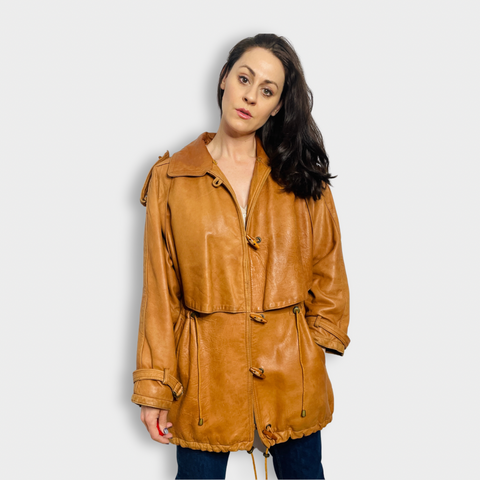
Why you SHOULD shop for Leather secondhand and Vintage
Leather coats are always a timeless style staple, but in the last year they have made a big splash in the trend cycle here in NYC. You might find yourself really wanting to add one these staple articles to your wardrobe, but conflicted on whether buying leather is ethical or not.

As this boom in demand for leather occurs, educate yourself before making your next leather purchase! Read on to learn about the effects the leather industry has on the environment, how you can shop for it ethically, and some advice that you might find contradicts my status as a vintage reseller.
How is the leather industry bad for the environment?
Some quick facts:
*Leather comes from livestock. The livestock industry is responsible for almost 15% of human-induced greenhouse gas emissions. It also contributes significantly to deforestation.
*The production is extremely energy and water intensive with a lot of chemicals used in the tanning process. It is estimated that 300kgs of chemicals are used per ton of hides tanned. Most new leather has been processed in developing countries like India, China and Bangladesh. These countries often lack the controls necessary to ensure that toxic chemicals are being disposed of responsibly.
*Chemicals used in tanning are often released into waterways resulting in toxic water supply for surrounding areas.
Additionally, the production of leather uses up a large quantity of water, with estimates suggesting that 17,093 litres (almost 4,500 gallons) of water needed to produce just 1 kg (2.2 pounds) of leather. That’s enough water to take 150 baths!
Why is shopping for leather secondhand better?
You prevent these items from ending up in a landfill. You might think that leather is exempt from getting passed over at thrift stores and ending up trashed, but that is unfortunately untrue. Because of the gap in knowledge on restoring and preserving these garments, many leather items with very fixable "damage" end up getting passed over.

Shopping secondhand or vintage (for any item) means you are not creating a demand for more to be made. Every time a new product comes off the shelf in a retail shop, a new item needs to be made and shipped to replace it. Purchasing second hand leather takes place outside of that chain of supply and demand therefore reducing your carbon footprint.
You are giving an existing item a longer lifespan. The material cost and environmental footprint for these items have already been made. By shopping for leather second hand, you are extending the life and reducing the carbon footprint.
Leather is a durable high quality material. An important part of slowing fashion is to consume in quality- not quantity. Purchasing a durable item, that has timeless style appeal, is always going to be the most sustainable choice when it comes to consuming.
Can I buy secondhand leather if I'm a vegan?
I have many vegan friends who avoid leather all together. Some consider it a walking advertisement for the leather industry.
Other vegan friends only wear or purchase leather if it is second hand.
As with all lifestyle choices--there is no one-size-fits-all rulebook. We continually have a never ending cycle of choices to make.
How to be sustainable with leather purchases:
Shop secondhand!
Check local thrift shops or flea markets for the most inexpensive purchase. If you can't find what you are looking for, many online marketplaces can help you with curated search features to help you find the style/size/color you are looking for. Check in with your favorite vintage curators to see if they have any in their online shop.
Learn how to clean up and care for secondhand leather!
If you have any type of leather in your wardrobe having a cleaner and conditioner to help you restore and maintain your article for longevity is a must. Use a brand that doesn't include toxic chemicals or animal by-products.
(Stay tuned for some of my favorite tips and tricks for keeping your leather looking good for years to come.)
Hold onto your leather!
You might find this contradicts my status as a vintage reseller who sources secondhand for everything in my shop. But it's the most sustainable advice I can give! With the right care, these pieces will last you a lifetime. Even if the exact style alters, within a few years it will cycle back. If you have the space and capability you can save these leather articles and pass them on to family/friends for years to come.
Disclosure: Some of the links above are affiliate links. This means that, at zero cost to you, I will earn an affiliate commission if you click through the link and finalize a purchase.

Comments (0)
There are no comments for this article. Be the first one to leave a message!